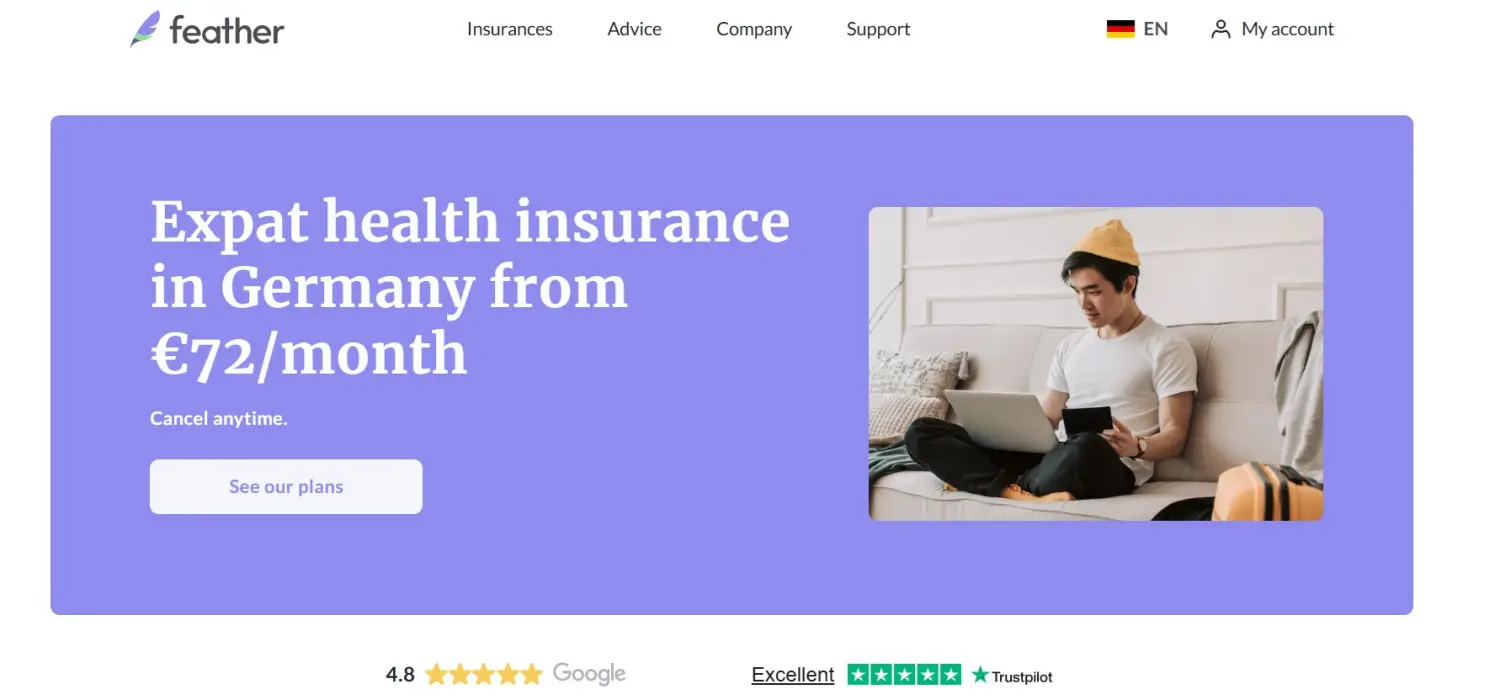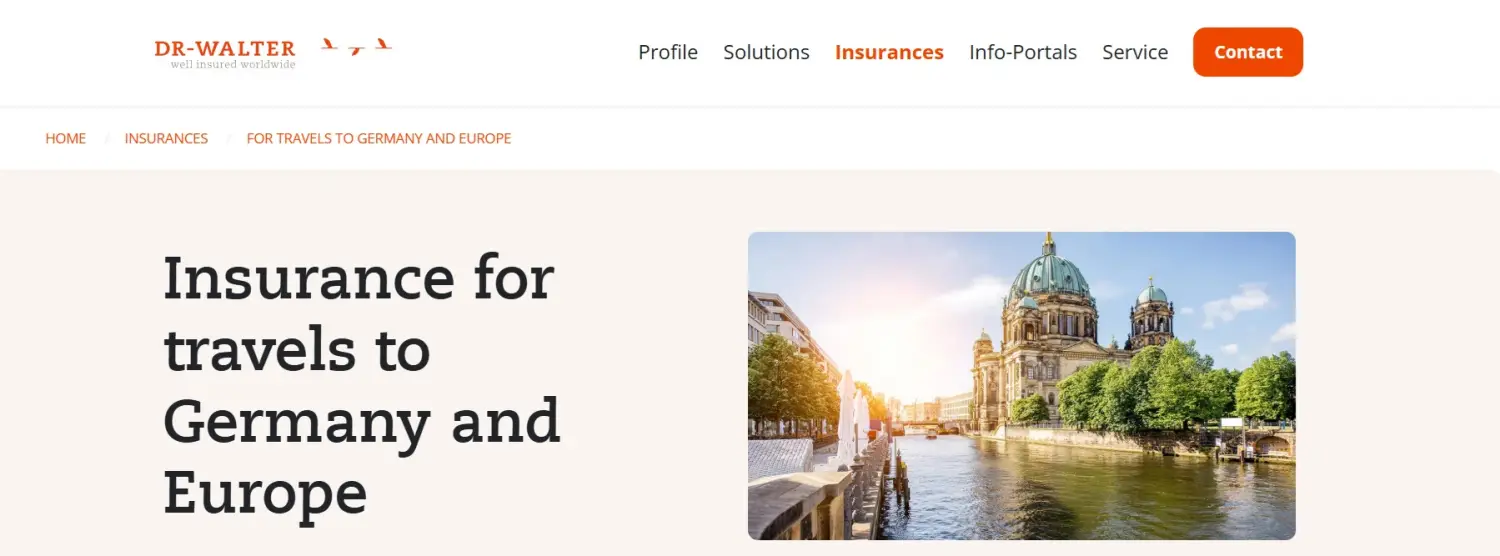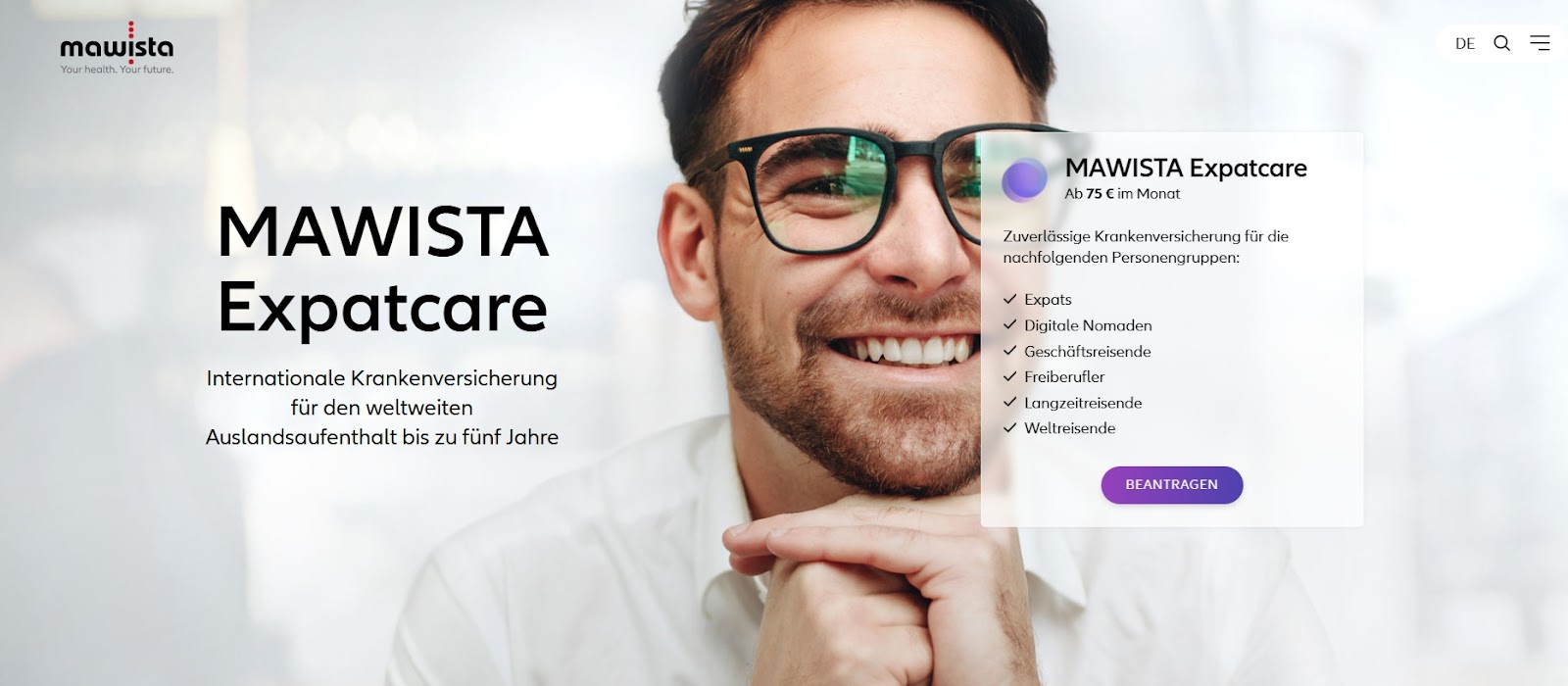
Moving to Germany is all bratwurst and bureaucracy until you realize your Anmeldung (registering your address with the local authorities, known as the Bürgeramt or Bürgerbüro) means nothing without health insurance. A freelancer dodging paperwork or a remote worker sipping Club-Mate in Kreuzberg, getting insurance isn’t optional—it’s the price for the golden ticket.
But finding a provider that’s expat-friendly, affordable, and answers emails in English? That’s where this guide comes in. We combed through expat forums, tested signups, and verified every claim so you can make educated choices while juggling the expat life. No hard sell, no legal jargon—just six providers that deliver results, with quirks included.
Here’s the 2025-updated list:

Feather is what happens when German efficiency meets startup UX. It’s one of the few insurance platforms in Germany designed specifically for expats, and it shows.
What makes Feather the slick newcomer in the expat insurance scene?—fully digital, English-first, and engineered for newcomers who’d rather not drown in German bureaucracy. Their expat health plan (starting around €72/month) covers hospital care, repatriation, and visa-legal protection, all manageable from their app. Claims? Snap a photo and submit—no paper trail, pure efficiency.
Bonus: you can cancel monthly, upgrade to public/private through your account, and snag your official visa docs the second you sign up. Just a heads-up: they act as an agent (not the insurer), so while their UX is smooth and customer support bags 5-star Trustpilot flexes, asking a broker for complex situations might still be your smartest move.

Ottonova feels like the private insurance version of a boutique hotel: polished, modern, and built for people who appreciate design. It’s one of the few private providers in Germany with an app that works as a private concierge—and in English. Through the app, you can submit bills, track reimbursements, and even message customer service. The onboarding also includes a questionnaire that tailors your plan based on lifestyle, work type, and visa needs.
Ottonova is made for those eligible for private insurance, which usually means high-earning freelancers or employees making above the annual threshold. If you're a young professional in tech or an expat with a stable income, this might be your move. It even has an expat-specific tariff that eases you in with more flexible conditions.
Downsides? It's private insurance, so switching back to public later can be difficult. Premiums also increase with age or added dependents. But if you’re eligible and plan to stay in Germany long-term, the experience is slick and the service human.

If you ask five expats who went with public insurance, at least four will name-drop TK. According to most, it’s Germany’s biggest public insurer, with comprehensive coverage, competitive rates, and a reputation for solid service.
TK covers almost everything: doctor visits, basic dental, hospitalization, some therapy, maternity, and preventive care. It also provides an English-language expat portal and supports brokers like Feather, who can help with signup. Employees and students typically have no trouble enrolling. It can be trickier (but allegedly not impossible) for freelancers and may require extra documentation or proof of income. It also has an app, 24/7 digital services, and people rave about it.
If you're looking for long-term, easy, and widely accepted coverage without surprises, TK is the gold standard.

DR-WALTER is the name that gets passed around in visa appointment waiting rooms and desperate Reddit threads. When your public insurance doesn’t come through, or you're still in paperwork purgatory, this is often the plan that saves your bum.
It offers expat-specific travel insurance plans (like EDUCARE24 and PROVISIT) that are visa-compliant and budget-friendly, some starting as low as 38.50 €. While technically travel insurance, these plans are fully accepted by immigration offices and can be activated in just hours.
DR‑WALTER is the Swiss Army knife of travel insurance for Germany and Europe—it’s neutral, independent, and has been around for over 60 years. Their promise? Full compliance with Schengen visa rules, affordable online purchases, and service that delivers.
Once you get a long-term visa or employment contract, you can easily switch to a public or private plan. Just make sure you cancel on time.

Allianz Care wins points with expats. Their international plans are built for people on the move: you can scale coverage up or down, add dental, maternity, or repatriation if you need it, and even choose your coverage zone so you’re not paying for care in the U.S. if you never set foot there. Claims are usually processed in about 48 hours (a minor miracle in insurance world), and they’ll reimburse you in 135 currencies—ideal if your bank account looks like a travel scrapbook.
Plus, you get telehealth, mental health support, and a 24/7 multilingual helpline to call when German bureaucracy finally breaks you. The only catch? Maternity coverage is stingy and comes with a long waiting period, and some reviewers complain about claim delays. Still, for most expats who want something reliable without losing sleep over fine print, so you can explore without a care in the world.

MAWISTA Expatcare is made for long-term stays—covering both internationals in Germany and Germans abroad for up to five years. You can sign up before you travel or once you’re already there, with monthly coverage that can be renewed for another five years in some cases.
It reimburses necessary medical costs for illness or accidents, with optional extras like check-ups and vaccinations. Most importantly, it’s officially recognised by German authorities and meets the health insurance requirements for a temporary residence permit.
If you’re new to Germany, picking a health insurance plan isn’t just a bureaucratic chore—it shapes how you access care, pay for services, and even determines if you can legally stay. Germany has a dual system: public and private health insurance. Each comes with its perks, pitfalls, and perfect-match profiles. Here's how they work:
Germany’s public insurance system is the default option for most employees, students, and residents. It’s legally regulated, widely accepted, and—honestly?—pretty generous. Your premium is based on your income (around 14.6% of your gross salary), and your employer usually covers half. This means the less you earn, the less you pay.
Coverage includes doctor visits, hospitalization, prescription medication, mental health, and even dental basics. Kids and spouses without income? They’re covered at no extra cost. You just flash your insurance card at the doctor’s office, and you're in.
However, the system can feel a bit... sluggish. Appointments with specialists might take weeks, and you won’t get deluxe perks like private hospital rooms or premium dental. Still, it’s reliable, affordable, and backed by one of the strongest public healthcare systems in the world.
Private insurance in Germany is the upscale alternative—but only if you qualify. It’s available to freelancers, self-employed folks, high earners (above €73,800/year), students, and civil servants. Instead of being income-based, private insurance calculates your premium based on your age, health, and the level of coverage you choose.
It’s more customizable: want faster appointments, vision and dental add-ons, or alternative treatments? You can get a plan tailored to that. Many expats enjoy reduced premiums when they join young and healthy—and some insurers, like Ottonova, offer English-first apps and no-nonsense reimbursements.
The catch? Switching back to public is tough (especially after age 55). And if your income drops, you’ll still pay the same premium. Plus, family members aren’t automatically included—you’ll need a separate plan for each. See you on the flipside.
No matter how you landed in Germany—a job, a lover, a wild hunch, midlife crisis, eat, pray, love—one thing's universal: you need health insurance. And now you know where to look. Each of these providers serves a different kind of lifestyle or expectations, so go with what fits your visa, your vibe, and your tolerance.
Sort the paperwork, screenshot that confirmation, and move on to the better parts of life in Germany (like figuring out how to recycle correctly).
Whether you're moving or settling in Germany, A4ord.de ensures trusted experts are just a click away.